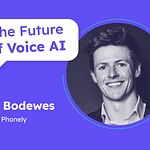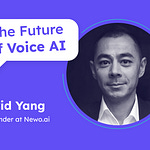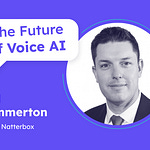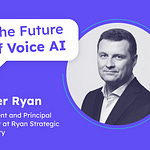In The Future of Voice AI series of interviews, I ask three questions to my guests:
- What problems do you currently see in Enterprise Voice AI?
- How does your company solve these problems?
- What solutions do you envision in the next 5 years?This episode’s guest is Chris Sorensen, CEO at PhoneBurner.
As PhoneBurner's CEO, Chris leads the development of industry-leading solutions to foster business communications and growth. He studied Advertising at Washington State University and has built a career in technology, serving a diverse range of organizations. Chris has held various executive roles in Revenue and Partnerships, leveraging his expertise to drive shared success for both his company and its clients.
As the leading power dialer for more than 15 years, PhoneBurner facilitates millions of monthly conversations. Through a strategic partnership with a Tier 1 carrier, PhoneBurner delivers exceptional live answer rates and call quality, prioritizing personalized, one-to-one human connections. This blend of dependability, quality, and personal engagement makes PhoneBurner a vital tool for improving outreach performance.
Recap Video
Takeaways
PhoneBurner’s customers range from real estate and insurance agents to small and large businesses.
Their main differentiation is 1:1 phone calls. Once someone picks up the phone, they ensure that there is a real person waiting there. No bots.
They don’t deploy multi-line parallel or auto-dialers.
Today, more than ever, there are more anti-spam technologies designed to stop that call from being received:
There are now quite popular anti-robocall Apps in App Stores
Carriers have anti-spam tech at the network layer
Android and iPhone have built-in (e.g. silence unknown callers) tech to fight spam as well
Devices also have built-in on-device transcription that can show you the first message and let you either take the call or not
AI doesn’t matter if you can’t get the call connected and somebody doesn’t pick up the call.
The most important goal is to achieve high answer rates and provide a great experience to end users.
To overcome this, PhoneBurner
Works with reputable business partners (know your customer)
Works with reputable and trusted carriers
Watches the traffic. If they see something suspicious, they flag and stop the customer. Quite similar to email (e.g. Sendgrid)
Transcription, summarization, and followups are important Voice AI technologies.
Noise cancellation, Accent localization are also quite important.
With translation, high accuracy is super important. Currently they see less interest in this. But it might change over time.
Today, trust in outbound calls is at the lowest point in history. 20 years ago people were getting 50-60% of their calls answered, now they struggle to hit 10%.
If the industry doesn’t get bots right, this will reduce the trust even further. If we mess this up entirely, there will be no trust in phone calls again.
The cost of placing phone calls is effectively 0. You can place 100K calls with $100.
If the consumer loses trust in phone calls, they won’t pick up the calls anymore.
Phoneburner doesn’t ever envision deploying voice-powered bots. Their mission is to focus on personal connections.
Fundamental long-term belief is in people and leveraging AI to make people’s jobs more productive.
Chris spends 50% of his day is to ensure there is trust in phone calls.











